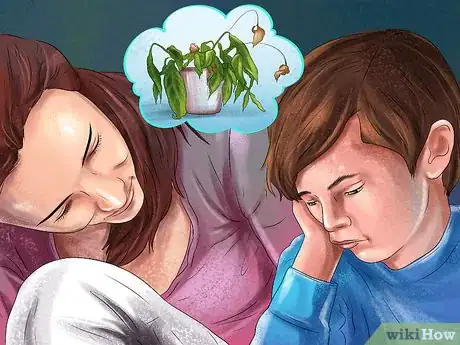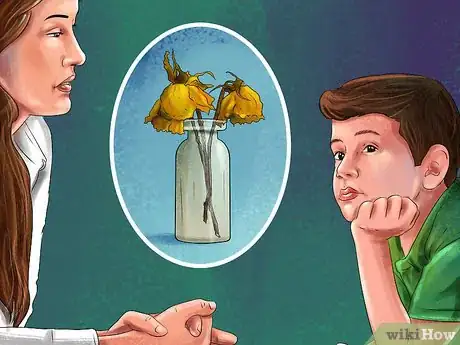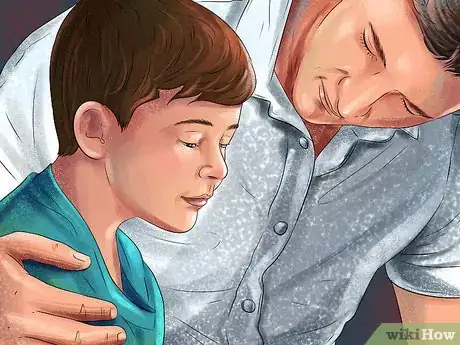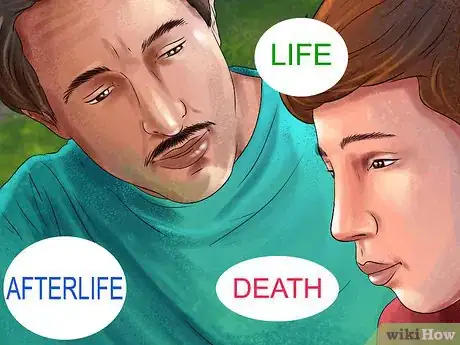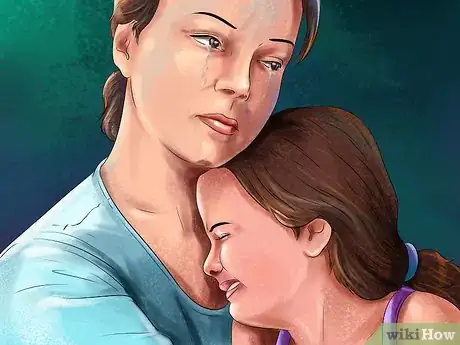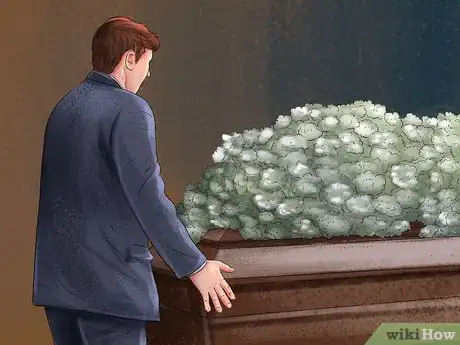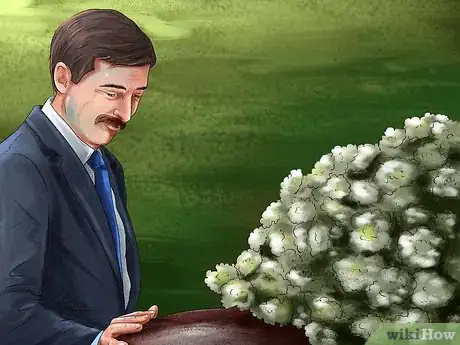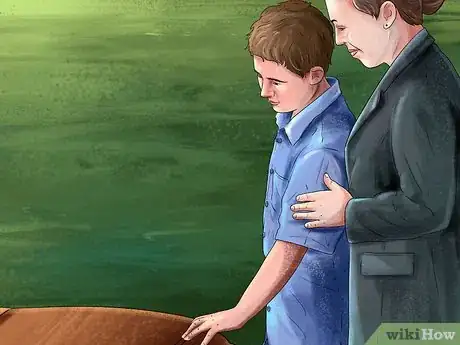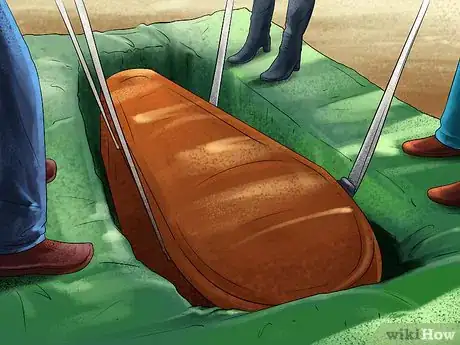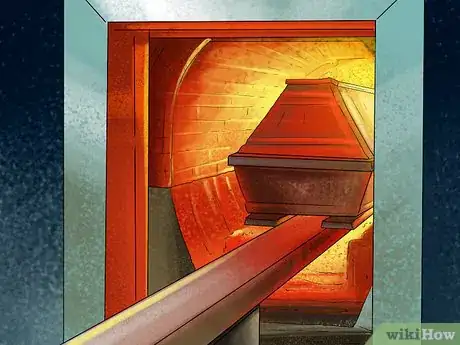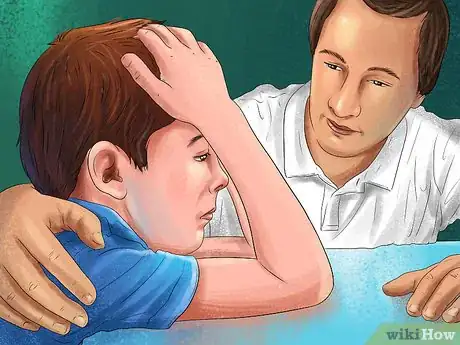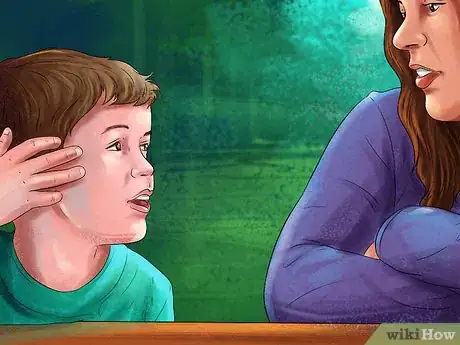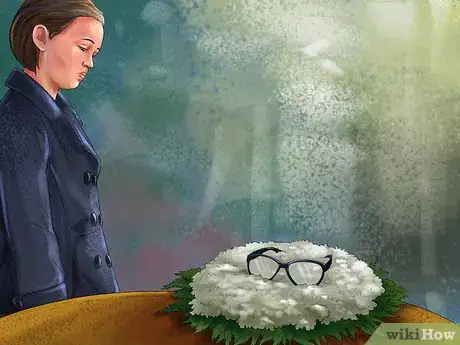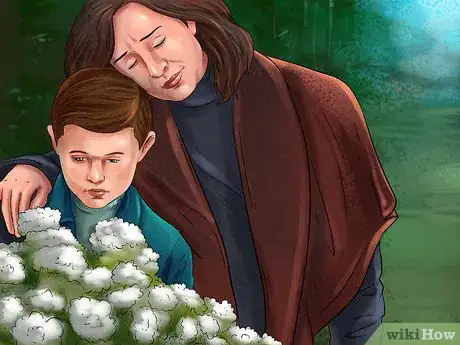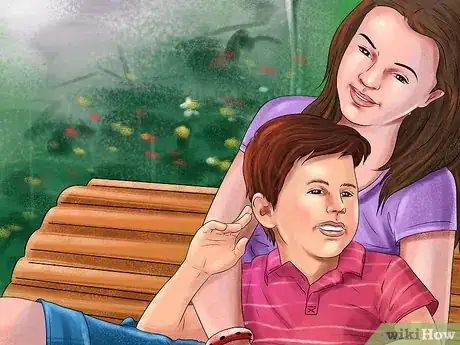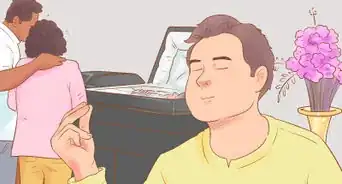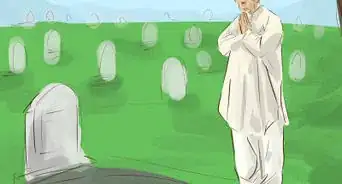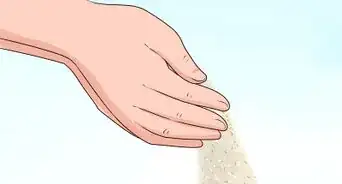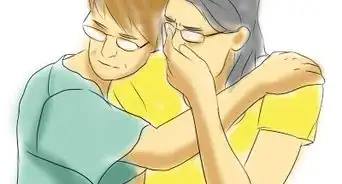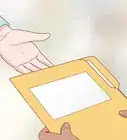This article was co-authored by Vernita Marsh, PhD. Dr. Vernita Marsh is a Licensed Clinical Psychologist and the CEO and Founder of Dr. Vernita Marsh & Associates and The Marsh Clinics®. With over 30 years of clinical psychology experience, she specializes in relationship therapy, grief counseling, family therapy, and intimate partner abuse counseling. Dr. Marsh offers consultation for therapists, coaches, and trainees of mental health. Dr. Marsh earned her PhD in Clinical Psychology from Michigan State University and completed both her postdoctoral and fellowship training at Harvard Medical School. She also has expertise in the area of Telehealth and has received Clinical Telehealth Health Provider Certification from Evergreen.
There are 8 references cited in this article, which can be found at the bottom of the page.
This article has been viewed 33,001 times.
Often times, adults are reluctant to talk about death, dying, and funerals with a child. However, if a child is old enough to love, then a child is old enough to understand death and the role funerals play in death.[1] By taking the time to talk about death and dying with your child, you can also discuss the role that funerals play in the process of death and dying. When discussing funerals, try to provide as much detail as necessary so that your child can understand and know what to expect during and after a funeral.
Steps
Discussing Death and Dying with Children
-
1Sit your child down. Before broaching the subject of death and funerals, find a time to sit your child down. Use this time to find out what they already know and to fill in any gaps in their knowledge of death and dying. Choose a calm time of day to talk about the subject, perhaps in the morning or during a time when you usually read to your child.
- Other opportunities to talk about death and dying with children are when they encounter a dead plant, tree insect, or animal, like a bird. Reinforce the idea that all living things die, but that it is a natural process that allows for new things to join everyone on Earth.[2]
-
2Find out what the child knows about death. Find out what your child already knows about death by asking them what they think about it. You can ask them, “What do you think happens when something dies?” or “Do you remember the dead flower? Why do you think it died?”
- Preschool children generally see death as reversible and temporary because they have no concept of permanence or experience with death to give them context. Children of this age are in what Piaget has called the pre-operational stage of development.[3] During this time, children may have a hard time with abstract concepts in general, such as death.
- By the time children are between the ages of 5 and 9, they come to understand death as more permanent and absolute. However, they usually do not relate it to themselves.[4]
- From the age of nine and through adolescence, children begin to fully comprehend the meaning of death, particularly the idea that they too will die someday.
Advertisement -
3Explain what “dead” means in simple language. When explaining death to your child, use straightforward, simple language. It helps to explain death as the absence of familiar life functions. Also, when explaining death, make sure to use reassuring language. Your child might ask questions about their death, as well as your death.
- The child might ask, "When will you die?" Your child asks this because they need reassurance that you will be there to take care of them. You can respond, "Don't worry. I will be here to take care of you. I don't expect to die for a very long time, and as long as I am alive, Mommy will take care of you."
- You can also reassure your child by telling them that most people live for a very long time before they die, and that it was not their fault that Grandma died.
- When you explain death you can say, “I have some sad news. Grandma died today. Her heart stopped beating. She does not breathe in and out anymore. She cannot eat, see, hear or move. She cannot feel pain or be hurt either. It is different from sleeping because all your body parts still work when you are sleeping. But Grandma's body parts have stopped working.”[5]
-
4Discuss your cultural beliefs. You can also reassure your child by discussing your cultural beliefs about life, death, and the afterlife. Your child will most likely ask where the deceased person is going and what will happen with their body. The best answer is to say what you honestly think and feel. If you believe there is a heaven in the afterlife, tell your child that their loved one is going to a beautiful place where they will be happy. If you don't believe in the afterlife, you can tell your child that these things are a mystery.
- If you're uncomfortable talking with your child about what happened to the deceased's body, you can always refer your child to someone they trust. For example, they might talk to a family member or a relative, or someone with professional experience, like a clergy member or a member of the hospice staff.
- It is important to try to answer all their questions, and answer them in simple terms. They may repeat the questions they don't fully understand the answers to. This is normal.
-
5Try to avoid euphemisms like “sleep” or “went away.” These euphemisms might confuse children, and cause them unnecessary fear. For example, a child may be afraid of sleeping or taking naps if you equate death with sleeping. Or, they might develop anxiety around separation, if they are told that someone “went away” when they died.
- It is also problematic to tell your child that someone died because of a sickness. Your child does not fully comprehend the difference between a serious illness, like cancer, and a temporary sickness, like a sore throat. Reassure your child by saying, "Only very, very serious illnesses may cause death. Everyone gets sick, but we usually get better again. Remember when Mommy had a stomach ache, and got better again?"
-
6Be honest and don't hide your feelings. Remember to be honest about the situation and your feelings. Don't try to hide your feelings from your child. Showing and verbalizing your own pain gives your child an example to follow. Holding back your feelings might give the impression that your child should repress their feelings, too. Let your children know that feeling sad, mad, confused, and crying are normal, healthy responses during this time.[6] [7]
- You can tell your child, for example, “It is okay to feel sad and to cry. Don't worry, I will take care of you.”
- On the other hand, it may take your child a minute to process the information and they might not respond right away. This is OK. Let them process the information. They will most likely bring the subject up on their own at a later time.
Explaining the Process
-
1Explain the purpose of a funeral. Before attending a funeral, explain what a funeral is to your child. Explain that funerals are a time for friends and family to come together to say thank you, goodbye, and I love you to the person who has died. Tell them that it is a time to remember and to pay their last respects to the person that died. It is also a time to celebrate that person's life, and to receive comfort and support from people who care.[8]
-
2Tell them what they will see. It is very important to explain to them what they will see. Explain to your child that they will see people expressing a variety of feelings. They will see people laughing, crying, hugging, and offering each other support.
- If the funeral will have an open casket, explain to them what it is and what they will see. You can say, “A casket is a special box that holds the whole body. It will be made of wood and the inside of it will look like a bed with a little pillow. Your grandma's body will be dressed up in a pretty outfit, and will be lying in the special box. There will be flowers and pictures around the box.”[9]
-
3Arrange a visit beforehand. To prepare your child, you can arrange a visit to the funeral home beforehand. You can show them the room where the casket will be, and where the bathroom and the playground is.
- Don't force your child to look at the body of the deceased, especially if your child is young.[10]
-
4Explain the procession and the burial. Also explain to your child what happens after the funeral. Tell them that everyone will drive to the cemetery where the casket will be buried. Explain to them that everyone will gather around the grave, a special hole that is a dug in the ground, to say prayers and to place flowers on the casket.
-
5Explain cremation if the body will be cremated. Children may be curious and concerned about the body if it has become ashes. Be sure to reassure your child that this process is not painful; try not to use the word "burn" since that word suggests pain. You might discuss cremation as a beautiful process that helps the body turn back into ashes in order for it to become a part of the earth.
- For example, “There is a special place called the crematorium. The crematorium has a special room, not like any room in our house, with a special fire. The fire is very, very hot, and will turn your grandma's body into ashes. She will not feel any heat or pain. Her ashes will be put in a pretty container, called an urn. The urn will be at the funeral.”[11]
Attending to the Child's Needs
-
1Consider what a child's grieving process is like. Children go through grief in a way that is different from adults, and becoming familiar with this process may make it easier for you to understand the child's behavior and feelings. These phases include:[12]
- Understanding what death is and knowing how to tell when it has happened.
- Recognizing that death exists and accepting the emotions that come along with knowing that death exists.
- Reorganizing their identity, relationships, and environment in accordance with their understanding of death.
-
2Let them ask questions. Your child will have questions about death and the whole process. Be attentive and try to answer as many questions as you can. If you do not have an answer to a question, it is OK to admit that you don't have the answer. Children understand openness and honesty. By showing them that it is OK to not know everything, they will also feel better about not knowing or understanding everything.[13]
- If you don't know an answer to a question you can say, “I'm not sure myself about that” or “I don't know the answer to that.”
-
3Encourage your child to participate. Help your child feel included in the process by encouraging them to participate. Encourage them to draw a picture or write a note to place in the casket.[14] You can bring them with you to pick out a card or flowers for the deceased's family. Or, you can ask them to pick a song or special reading to say at the funeral.[15]
-
4Tell them what others might say to them. Also inform your child about what others might tell them. Tell them that others might say, “Don't cry, ”“Be brave,” “Be strong,” or “Be extra nice to your parents, now.” Therefore, they can get conflicting messages. However, let them know that is OK to feel whatever it is they feel; that it is OK to cry.[16]
- Try to help your child understand that people cope with death differently, and that people are raised to deal with death differently. Explain to them that what those people were taught about death when they were young is different from what you are teaching them about it now.[17]
-
5Don't force them to attend. If your child does not want to attend the funeral, do not force them to. If you see that your child is feeling sad or worried, ask them about their feelings and listen. Provide them comfort by hugging them and by telling them to not worry, and that everything will be OK.
- After a few minutes of talking and listening, do a fun activity together that will lighten their mood. For example, play a game, go to the park, cook, or go enjoy an activity together.[18]
Expert Q&A
-
QuestionShould children go to open casket funerals?
 Vernita Marsh, PhDDr. Vernita Marsh is a Licensed Clinical Psychologist and the CEO and Founder of Dr. Vernita Marsh & Associates and The Marsh Clinics®. With over 30 years of clinical psychology experience, she specializes in relationship therapy, grief counseling, family therapy, and intimate partner abuse counseling. Dr. Marsh offers consultation for therapists, coaches, and trainees of mental health. Dr. Marsh earned her PhD in Clinical Psychology from Michigan State University and completed both her postdoctoral and fellowship training at Harvard Medical School. She also has expertise in the area of Telehealth and has received Clinical Telehealth Health Provider Certification from Evergreen.
Vernita Marsh, PhDDr. Vernita Marsh is a Licensed Clinical Psychologist and the CEO and Founder of Dr. Vernita Marsh & Associates and The Marsh Clinics®. With over 30 years of clinical psychology experience, she specializes in relationship therapy, grief counseling, family therapy, and intimate partner abuse counseling. Dr. Marsh offers consultation for therapists, coaches, and trainees of mental health. Dr. Marsh earned her PhD in Clinical Psychology from Michigan State University and completed both her postdoctoral and fellowship training at Harvard Medical School. She also has expertise in the area of Telehealth and has received Clinical Telehealth Health Provider Certification from Evergreen.
Licensed Clinical Psychologist, Consultant, & Speaker This isn't a great idea, as seeing an open casket can be very traumatic for a young child. In some cases, children who see open caskets at a young age are continuously traumatized by the event through their adult years.
This isn't a great idea, as seeing an open casket can be very traumatic for a young child. In some cases, children who see open caskets at a young age are continuously traumatized by the event through their adult years.
References
- ↑ http://www.griefhealing.com/column-explaining-the-funeral-to-your-children.htm
- ↑ https://childdevelopmentinfo.com/how-to-be-a-parent/communication/talk-to-kids-death/
- ↑ https://www.verywell.com/piagets-stages-of-cognitive-development-2795457
- ↑ https://childdevelopmentinfo.com/how-to-be-a-parent/communication/talk-to-kids-death/
- ↑ http://www.griefhealing.com/column-explaining-the-funeral-to-your-children.htm
- ↑ http://www.griefhealing.com/column-explaining-the-funeral-to-your-children.htm
- ↑ Vernita Marsh, PhD. Licensed Clinical Psychologist, Consultant, & Speaker. Expert Interview. 7 April 2022.
- ↑ http://www.griefhealingblog.com/2013/08/when-children-attend-funeral-some.html
- ↑ http://www.griefhealingblog.com/2013/08/when-children-attend-funeral-some.html
- ↑ Vernita Marsh, PhD. Licensed Clinical Psychologist, Consultant, & Speaker. Expert Interview. 7 April 2022.
- ↑ http://www.griefhealingblog.com/2013/08/when-children-attend-funeral-some.html
- ↑ https://www.psychologytoday.com/blog/hard-realities/201301/how-do-children-comprehend-the-concept-death
- ↑ http://www.griefhealingblog.com/2013/08/when-children-attend-funeral-some.html
- ↑ Vernita Marsh, PhD. Licensed Clinical Psychologist, Consultant, & Speaker. Expert Interview. 7 April 2022.
- ↑ http://www.griefhealing.com/column-explaining-the-funeral-to-your-children.htm
- ↑ Vernita Marsh, PhD. Licensed Clinical Psychologist, Consultant, & Speaker. Expert Interview. 7 April 2022.
- ↑ http://www.griefhealingblog.com/2013/07/explaining-death-to-children.html
- ↑ http://kidshealth.org/en/parents/death.html
